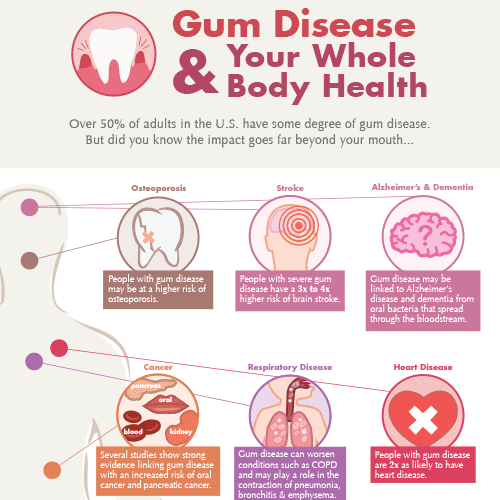Gum disease has been linked to three respiratory diseases – pneumonia, acute bronchitis and chronic obstructive pulmonary dis ease (COPD).
ease (COPD).
COPD is the fourth leading cause of death in the United States, affecting over 11 million people. Gum disease is the most common disease infecting adults. Rather than just a localized disease only affecting the mouth, evidence now shows that gum disease is systemically connected with health implications throughout the body. Both COPD and gum disease are chronic, slowly developing diseases that are usually diagnosed after the age of 40, and are higher in smokers than in non-smokers.
It is thought that both COPD and pneumonia are caused when pathogenic bacteria from the mouth/sinus cavity are inhaled, the body doesn’t fight off these new invaders, and they colonize and affect the lower respiratory tract (trachea, bronchi, and lungs).
Gum disease is affected by both a bacterial infection in your mouth AND your body’s inflammatory response to the infection. Part of the inflammatory response is to destroy the connective tissue around your teeth that hold them in place – your body thinks if it can get rid of the teeth, it can get rid of the infection. With respiratory diseases, it is the body’s overreaction to the bacteria and to the inflammatory process can lead to destruction of connective tissue between the air sacs in your lungs. When the individual air sacs lose connective tissue, they morph into bigger air sacs. These bigger air sacs actually have less surface area to exchange oxygen compared to the amount of original smaller air sacs.
Studies have found those with respiratory diseases have worse periodontal disease, and gum disease can aggravate symptoms of COPD and make flare ups worse, but more research needs to be done to fully understand the link.

